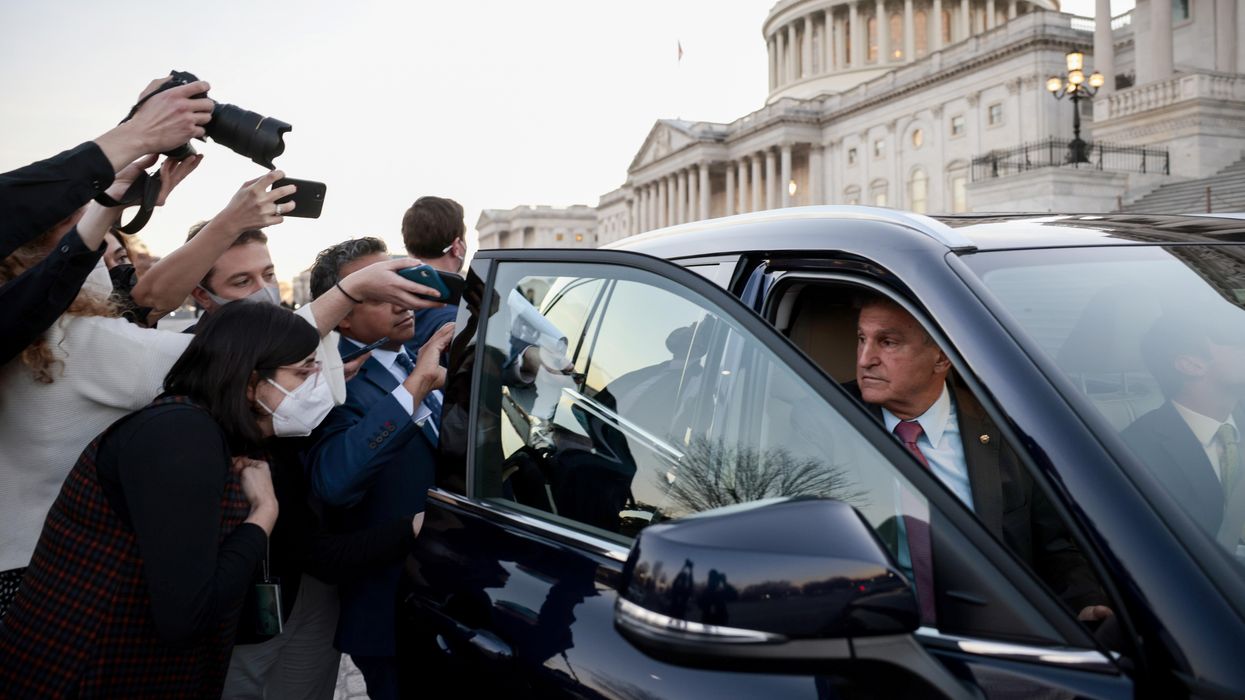The Senate remains in session during the final days of 2021, but the agenda is limited to clearing some of President Biden’s nominees for federal office. That’s because two of the Democratic majority’s signature initiatives — the social spending bill known as Build Back Better and a pair of election reform bills — remain at the mercy of the filibuster.
While Biden, Sen. Joe Manchin and others may continue negotiations on the details of BBB, there isn’t much to discuss on the Freedom to Vote Act and the John Lewis Voting Rights Advancement Act. Except, of course, whether there’s a way to break through the GOP-erected barriers.
With two moderate Democrats continuing to voice opposition to eliminating or changing the filibuster rules, there doesn’t appear to be an obvious path forward in the 50-50 Senate. But some proponents of the two voting rights bills believe West Virginia’s Manchin and Kyrsten Sinema of Arizona have left the door open to rules alterations.
“The read that I’ve seen in some outlets like Politico about Sinema and Manchin is the wrong one,” said Damon Effingham, director of federal reform for RepresentUs. “If you look at the things they are saying and especially what Manchin is doing, they are interested in having a functional Senate.”
Effingham argues that Manchin’s identification of hyperpartisanship as a cause of dysfunction in the Senate is evidence he is open to changes, as long as they aren’t too drastic.
“What I think is the read here is they don’t want to take a hasty action that has a pendulum impact on federal policy,” said Effingham. After all, many have noted, drastic changes now for voting rights bills could pave the way for looser rules on future policy votes.
Manchin perhaps signaled his willingness to change the filibuster when he met with an expert on Senate rules Thursday night.
https://twitter.com/JakeSherman/status/1471855688108421127
And Sinema’s spokesman appeared to leave the door open earlier this week.
“If there are proposals to make the Senate work better for everyday Americans without risking repeated radical reversals in federal policy, Senator Sinema is eager to hear such ideas and — as always — is willing to engage in good-faith discussions with her colleagues," John LaBombard told Politico.
Stephen Spaulding, senior counsel for public policy and government affairs at Common Cause, echoed Effingham’s take.
“Conversations are really underway to find a way forward that restores the Senate as a place where senators come together, debate issues of the day and actually pass them, not bury them,” said Spaulding. “I think there is a desire — not just among Senate Democrats, among Republicans as well. The Senate is not working as well as it has in the past.”
Spaulding identified a number of previous efforts around altering the filibuster while preserving a significant portion of the rule, ideas that may be considered again.
One idea, which Manchin has indicated he could support, would limit the types of votes on which a filibuster could be deployed. For example, filibusters are commonly used when the Senate votes on a “motion to proceed,” which brings a bill to the chamber floor for consideration. By banning filibusters on those votes, legislation would at least be ensured time for debate before senators can engage in a filibuster on the vote to pass the bill.
Another idea, and one that President Biden has supported, is restoring the “talking filibuster.” Under current rules, a senator can merely announce a filibuster without actually going through the painstaking work of talking a bill to death. (“Think “Mr. Smith Goes to Washington.”) Democratic Sen. Jeff Merkley of Oregon has proposed such a change to the rules in the past.
And a third option mentioned by Spaulidng would be an agreement under which both parties are guaranteed the opportunity to introduce a certain number of amendments.
“It’s not ‘abolish the filibuster or nothing,’” he said. “It’s a matter of restoring the Senate.”
Other proponents of the Freedom to Vote Act and the John Lewis bill have argued that the Senate should create a “carveout” for voting rights legislation, or have pointed to recent maneuvering that allowed the chamber to increase the debt ceiling with a simple majority vote. But those options do not appear to be under serious discussion.
The John Lewis Voting Rights Advancement Act would restore some voting rights protections that have been struck down by the Supreme Court. Previous iterations of the Voting Rights Act were passed with bipartisan support, but Lisa Murkowski of Alaska is the only Republican senator who has said she would vote for VRAA. That still leaves Democrats nine votes short of breaking a filibuster.
And the Freedom to Vote Act, a sweeping bill that sets federal standards for elections, does not have any Republican backing in the Senate. It replaced the For the People Act after Manchin negotiated changes that he hoped would bring on GOP support.




















Trump & Hegseth gave Mark Kelly a huge 2028 gift